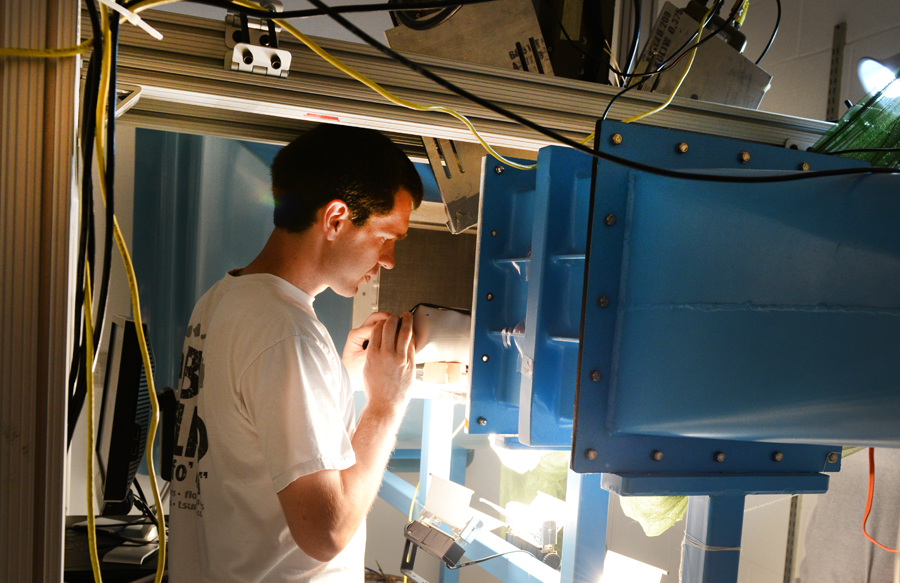The Aerospace Engineering Graduate Program encourages applicants with other related engineering backgrounds to apply to our program. The Graduate Admissions Committee may recommend that an incoming student take selected undergraduate courses before the core courses. Please review our Graduate Program Prerequisites page.
The University of Maryland’s Graduate School accepts applications through gradapply.umd.edu. Before completing the application, applicants are asked to check the Admissions Requirements site for specific instructions.
Please note: When completing the Educational Intent section in the online application, there are two entries for the A. James Clark School of Engineering. The Master's and Ph.D. programs are listed in the second entry that says "A. James Clark School of Engineering - Research Programs.
As required by the Graduate School, all application materials are to be submitted electronically:
- Graduate application
- Transcripts
- Statement of purpose
- Letters of recommendation
- All Program/Department additional supporting documents (writing samples, CV/resume)
- Non-refundable application fee ($75) for each program to which an applicant applies
The electronic submission of application materials helps expedite the review of an application. Completed applications are reviewed by an admissions committee in each graduate degree program. The recommendations of the committees are submitted to the Dean of the Graduate School, who will make the final admission decision. Students seeking to complete graduate work at the University of Maryland for degree purposes must be formally admitted to the Graduate School by the Dean.
UMD's Step-by-Step Guide to Applying
Applicants are encouraged to contact the Hobsons online application’s helpdesk for any technical issues.
For questions related to the admissions process, prospective students may contact the Graduate School.
The University of Maryland is dedicated to maintaining a vibrant international graduate student community. The office of International Students and Scholars Services (ISSS) is a valuable resource of information and assistance for prospective and current international students. International applicants are encouraged to explore the services they offer, and contact them with related questions.
The University of Maryland Graduate School offers admission to international students based on academic information; it is not a guarantee of attendance. Admitted international students will then receive instructions about obtaining the appropriate visa to study at the University of Maryland which will require submission of additional documents. Please see the Graduate Admissions Process for International applicants for more information.
For information regarding additional requirements and documents needed for your application, please visit the Office of International Services website.
Additional Resources for International Applicants
The student's files are evaluated by the members of the Graduate Admissions Committee and by a faculty member(s) whose area of research is related to the student's stated research interest. Only students who meet or exceed the admissions standards of the Department of Aerospace Engineering will be considered for admission.
The following are some of the criteria used in deciding whether to admit an applicant:
- An applicant’s competitive ranking among other applicants, based on test scores and GPA
- The quality of an applicant’s letters of recommendation, including the authority of the author
- A match of the applicant’s research interests with the interests of the Aerospace Engineering faculty
- An applicant’s degree of professional experience
- The availability of funding
Since admission into the program is frequently contingent on the availability of financial support, which requires the student to engage in focused research, applicants should determine carefully which areas of aerospace engineering most interest them, and to indicate their interests explicitly in their statement of goals and experiences. Contacting faculty directly may be useful, but the applicants should carefully examine the field of interest of the faculty member(s) whom they wish to contact.
Admission recommendations and offers of financial support are made on a rolling basis. Most graduate assistantship offers are made before the May 15 deadline. Rejection letters to candidates who do not have the required qualifications are also sent out also on a rolling basis. In some cases no decision is made until May 31 for the Fall Semester or October 31 for the Spring Semester.
The University of Maryland and the Clark School of Engineering recognize the critical importance of a diverse student body and are strongly committed to ethnic and gender diversity. Within the Clark School of Engineering are two offices: the Center for Minorities in Science and Engineering (CMSE) and the Women In Engineering Program (WIE). Their mission is to recruit, retain, and graduate underrepresented minorities and female students in the engineering and science fields. CMSE and WIE offer many programs, including mentoring, research internships, and summer programs, all of which are designed to aid in maintaining diversity goals.
Supporting the efforts of CMSE and WIE, and providing valuable assistance to the Clark School, are three student societies—the Black Engineers Society, the Society of Hispanic Engineers, and the Society of Women Engineers.
